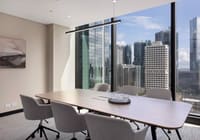
Shopping centres turn to coffee, cars to 'internet-proof' themselves
Cafes and car retailers are the new anchor tenants for shopping centres as owners seek ways to entice and then keep shoppers mooching around their malls.
According to Christophe Cuvillier, the chief executive of Unibail-Rodamco, which last year made a $32.8 billion takeover offer for Sir Frank Lowy’s Westfield Corp, Australian shopping centres have made themselves more ”internet-proof” than anywhere else in the world.
He said Westfield had led the way overseas, offering diverse mall tenants such as car dealerships and engaging food courts.
”It is a trend that we will expand in order to keep malls relevant to shoppers as destinations,” Mr Cuvillier said.
While the arrival in Australia of global e-commerce giant Amazon has been low key so far, retail observers say it will be a ”slow burn” and will start to impact the $300 billion sector in the coming year.

But despite the increasing online competition, nine in 10 Australian retailers are planning to maintain or increase the number of bricks and mortar stores in the year ahead, research reveals.
And people still prefer in-store shopping to online, with a preference for bricks and mortar most pronounced among baby boomers (71 per cent) and pre-boomers (76 per cent).
Consumers increased their visits to shopping centres over the past two years, especially local shopping centres and stores (both up 16 per cent), according to the latest Commonwealth Bank Retail Insights Report.
Jerry Macey, national manager retail, Commonwealth Bank, said there was a clear desire among today’s consumers to shop more locally. This was consistent across the generations but particularly strong in older shoppers.
”Although online shopping is catching up quickly and runs a close second, there is an opportunity for bricks and mortar retailers to tap into this trend through offering a better customer experience,” Mr Macey said.
Shift in car sales
Car manufacturers are meeting this demand, bringing the vehicles to consumers by leasing space in shopping centres. The cost of land is another factor driving more car dealers into shopping centres or shopfronts.
Land prices in metropolitan areas are now prohibitive for people wanting to establish a traditional car yard, even on busy roads. Many car yards in Sydney and Melbourne are being redeveloped into mixed-use projects.
Toyota is the latest to enter the fray with a lease at GPT’s Rouse Hill Town Centre in Sydney’s west. Other similar shops are the Subaru store at Werribee Plaza and a pop-up Lexus store at Westfield Doncaster.
Tesla has been operating in Westfield malls for some time, while Dexus leased some short-term space to Ferrari in the lobby of its 1 Bligh Street office tower in Sydney.
According to Ben Fitzgerald, who runs the first Toyota shop in a shopping centre in Australia, the focus is on attracting people who might find a traditional car yard inconvenient or intimidating.
The new store was more customer-service focused and female-friendly, with three customer service staff and two salespeople on deck on weekends.
”The focus will be on an improved customer experience, being convenience and permission to browse with no strings attached,” he said.
”There will be digital screens to allow customers to build their preferences.”
Statistics show that 8 per cent of people who visit car dealers are in the market for a car now, 70 per cent will be in the next 12 months, and 25 per cent are just browsing.
Cafe culture
The rise of the coffee shop has also seen coffee replace Coca-Cola as the beverage of choice for retailers, with an increase in coffee operators throughout the Sydney CBD, according to Colliers International.
“Coca-Cola used to be the most desired beverage for retailers at almost every restaurant, café, convenience store, takeaway store and high-end hospitality venue due to the sales revenue it generated for stockists,” said Pieter Englebrecht, retail leasing executive at Colliers International.
“However, over the last decade, Coca-Cola sales have begun to decline as the global population is becoming more health conscious and palates are changing.”
He said more than 80 per cent of new food operator proposals in its centres had a provision for coffee on their menu. “The coffee catch-up or business meeting is part of everyday life in Australia, with competition for the best cup and customer dollar reaching new heights.”
Investment in retail
With the changing nature of shopping centres, there has been a rise in demand to own them.
According to Steven Lerche, Savills national director of retail investments, interest in the retail property market was fuelled by low interest rates, rapid population growth and large volumes of foreign capital in 2017.
“Market conditions remained strong across all sectors, but the biggest winners have been the non-discretionary neighbourhood centres and freestanding supermarkets – both of which have been hotly contested,” Mr Lerche said.
The biggest losers included sub-regional centres (medium-sized centres, usually with a discount department store), particularly in regional locations. Discount department stores have been put under pressure by Amazon, which has been damaging to investor confidence.
Mr Lerche said most active investors were onshore real estate investment trusts, funds, syndicates and private buyers. Offshore Chinese investment had been patchy, with interested concentrated on well-located redevelopment opportunities near train stations, allowing for integrated living, shopping and entertaining.
“Large-format retail has remained an active sector, with yields falling sharply as investors have been keen to secure such assets,” he said.
Mr Lerche said despite retail spending shifting, he expected investment sales volumes in 2018 to remain steady.
“Yields will remain tight due to the continued historically low interest rates, and the private sector is likely to continue to cash out at what they believe to be the top of the market,” he said.
“In 2018, we could see an increase of supply softening in the market due to a thinner buyer pool. Sydney will remain the defensive location with population growth fuelling investment demand.”













